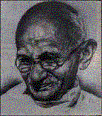

GANDHI. BtVS Intertext/Allusion.
 Born Mohandas Karamchand Gandhi (1869 – 1948) in India. Often referred to as ‘Mahatma’, meaning ‘Great Soul’.
Gandhi studied law in London and traveled to South Africa in 1893 to work
for a legal firm. There he became
familiar with the plight of the Indian people, who were treated as sub-human by
the white ruling society. Gandhi worked for 22 years to help secure rights for
Indians in South Africa, and in 1915, returned to his homeland, spending the
last 33 years of his life fighting to free India from British rule.
On January 30, 1948, Gandhi was assassinated by a religious extremist.ist.
Born Mohandas Karamchand Gandhi (1869 – 1948) in India. Often referred to as ‘Mahatma’, meaning ‘Great Soul’.
Gandhi studied law in London and traveled to South Africa in 1893 to work
for a legal firm. There he became
familiar with the plight of the Indian people, who were treated as sub-human by
the white ruling society. Gandhi worked for 22 years to help secure rights for
Indians in South Africa, and in 1915, returned to his homeland, spending the
last 33 years of his life fighting to free India from British rule.
On January 30, 1948, Gandhi was assassinated by a religious extremist.ist.
Gandhi’s political achievements were tied to his philosophy of “Satyagraha”, which translated means, “the force that is generated through holding fast to Truth”. For Gandhi, mass Satyagraha had two components: civil disobedience and non-co-operation. Civil disobedience entailed breaking a specific, unjust law, and welcoming the consequences (physical violence, imprisonment). Non-co-operation focused on refusing to pay taxes to the British government, national strikes, and boycotts of British goods. Both these components of Satyagraha required an attitude of nonviolence. Gandhi believed that his methods would prick the consciences of his opponents, causing them to rethink their unjust positions. He also understood that his opponents’ power lay in forcing people to obey, through fear of physical punishment. Gandhi’s work sparked international awareness of, and sympathy for, his cause and he succeeded in liberating India from colonialist Britain.
In BtVS, clear allusions to Gandhi occur in the Season Three premiere episode, “Anne.” After the emotionally traumatic experiences of Season Two, Buffy rejects her role as Slayer and its inherent violence. She leaves Sunnydale for the big city and becomes an anonymous waitress, Anne. Reluctantly, Buffy again takes on her role of Slayer, when she discovers that street kids are disappearing to a hell dimension, lured there by a demon masquerading as the clean-cut human, Ken. Buffy goes to hell, and sees that Ken has the kids working as slaves, who are forced to forget their individual identities. Any lack of obedience or displays of self-worth are met with physical punishment. Buffy leads a violent revolt and manages to escape, with fellow prisoners in tow.
As Ken lies on the floor struggling, his legs impaled by the bars of an iron gate, he sputters:
Ken: You’ve ruined…you…
Buffy: Hey Ken, wanna see my impression of Gandhi? (crushes his skull with a club)
Lily: Gandhi?
Buffy: Well, you know, if he was really pissed off.
One assumes that Gandhi was “really pissed off” about the injustices perpetuated in India and South Africa, yet his philosophy of nonviolence was successful in granting freedom to the Indian people. Buffy’s ironic comments illustrate how her reality does not permit her to adopt Gandhi’s methods. The demons have no consciences to prick and there is no public awareness of Buffy’s constant toil to save the human world from demonic doom. When Buffy is ready again, to accept her destiny of violence, she is ready to return to Sunnydale.
And in Season Three, Gandhi’s assassination is echoed in the episode, “Consequences.” Faith, who has accidentally slain Allen Finch, the deputy mayor, attempts to rationalize her actions:
Faith: …The guy I offed was no Gandhi. I mean, we just saw, he was mixed up in dirty dealings.
For detailed information on Gandhi’s life and work, see http://www.mkgandhi.org/index.htm
For a commentary on Buffy’s use of violence, see Mimi Marinucci, “Feminism and the Ethics of Violence: Why Buffy Kicks Ass” in Buffy the Vampire Slayer and Philosophy: Fear and Trembling in Sunnydale, edited by James B. South (Illinois: Open Court, 2003), pp. 61–75.
Image from http://jmi.nic.in/MahatmaGandhi.htm